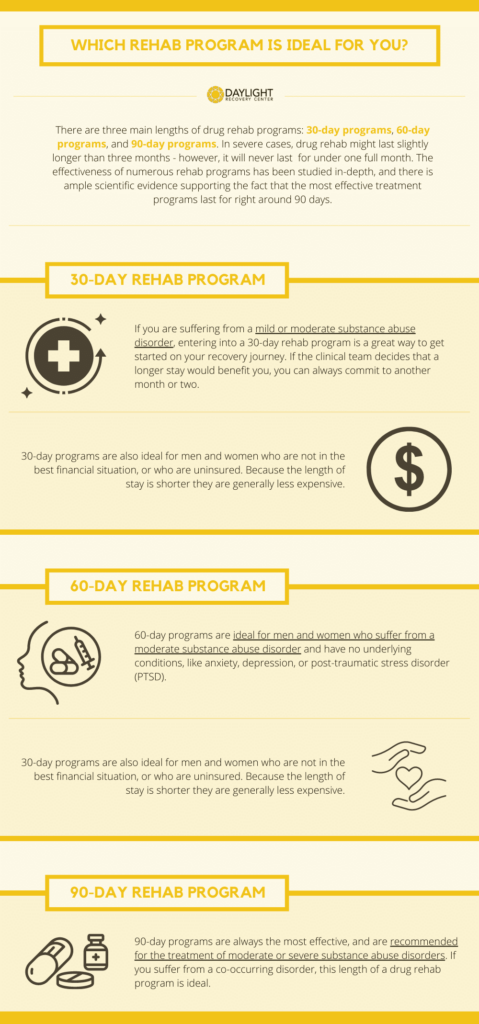Going to addiction treatment is a major life-changing commitment. Not only are you committing to attempting to live a life without drugs or alcohol, but you are also committing a generous chunk of time to your health and healing. One of the most commonly asked questions about treatment is “how long does outpatient rehab last?” The truth is, everyone is different with unique needs, and no two treatment plans are exactly the same. The length of outpatient rehab varies from one person to the next, but it generally lasts 30, 60, or 90 days.
Outpatient Rehab is Only One Part of the Bigger Picture
If you are wondering how long outpatient rehab lasts, it’s important to remember that outpatient is only one level of care offered in addiction treatment. Many people begin their treatment journey with inpatient rehab, where they spend 28-45 days, before moving onto a lower level of care like partial hospitalization (PHP), intensive outpatient programming (IOP), or standard outpatient.
In general, most rehab programs last 30, 60, or 90-days, with some having extended care options that last for more than 3 months. However, this doesn’t mean you will be spending your entire time in treatment in one level of care. For example, you may spend 30 days in residential treatment and 60 in outpatient. Others may spend 45 days in residential care and a similar amount of time in outpatient. The exact length of outpatient rehab varies from one person to the next.

How Long Does Treatment Need to Last for it to be Effective?
According to the National Institute on Drug Abuse’s Principles of Effective Treatment, remaining in treatment for an adequate period of time is critical. How long you should spend in rehab depends on the degree of your problems and your treatment needs. However, research has shown that most people who seek treatment for substance abuse benefit from spending at least 3 months in treatment.[1]
Programs that last at least 3 months (90 days) tend to have the best treatment outcomes as they help patients significantly reduce or stop their drug use. Furthermore, studies show the longer treatment programs last, the better outcomes tend to be. This is because recovery is a long-term process. Similar to other chronic diseases, relapses can occur, but extended care can help prevent a return to drug use.
It’s important to note that people who leave treatment prematurely may be more susceptible to relapse. Even if you are eager to complete your treatment program, it’s important to remain in rehab until you are discharged by your clinician. While 90-days in outpatient rehab can seem like a long time, it is minuscule compared to the life ahead of you if you stay sober.
Factors That Determine How Long Your Outpatient Rehab Program Will Last
The most effective outpatient rehab programs tend to the needs of each individual.[1] As a result, depending on the severity of your addiction and your individual needs, the length of outpatient rehab may vary. Some contributing factors that determine how long outpatient rehab lasts include:
- The severity of your addiction. People who have been addicted to substances longer and have more serious patterns of substance use can benefit from longer-lasting programs.
- Whether or not you need detox. If you need medical detox, your treatment program could last up to two weeks longer.
- The presence of co-occurring mental health conditions. People who struggle with mental health conditions like depression, bipolar disorder, and PTSD may benefit from longer treatment programs that dedicate plenty of time to addressing these issues.
- Your past experiences with treatment and/or relapse. If you’ve already been to rehab one or more times before, you may simply need a short-term program to address your relapse and help you get back on track.
- Your progress as you go through treatment. If you refuse to participate in therapy or are reluctant to take your therapist’s suggestions, he or she may recommend you stay in rehab longer. On the other hand, the more you participate and exhibit positive changes, the sooner you will be discharged.
Spending the amount of time your therapist recommends in an outpatient program is essential for your success in recovery. Always take your counselor’s suggestions, participate in your therapy sessions, and try to soak in every moment of therapy possible.
Outpatient Will Be Shorter if You’ve Already Completed a Residential Program
If you have already completed an inpatient or partial hospitalization program, you may not need to spend a full 90-days in outpatient rehab. Instead, you may use outpatient as a resource to help you transition from residential treatment to independent living.
While many people are excited to leave an inpatient program and are eager to get back on with their lives, rushing the recovery process can be detrimental in the long run. Even spending as little as 14-28 days in an outpatient program can help you settle into your new life and provide you with adequate support.
Find Out if Outpatient Rehab in West Palm Beach is Right For You
If you or a loved one are struggling with addiction, it may be difficult to determine exactly what you need in terms of addiction treatment. Instead of going at it alone, speak with one of our admissions coordinators and let us help. Call now to find a drug treatment program that is right for you.
References:



